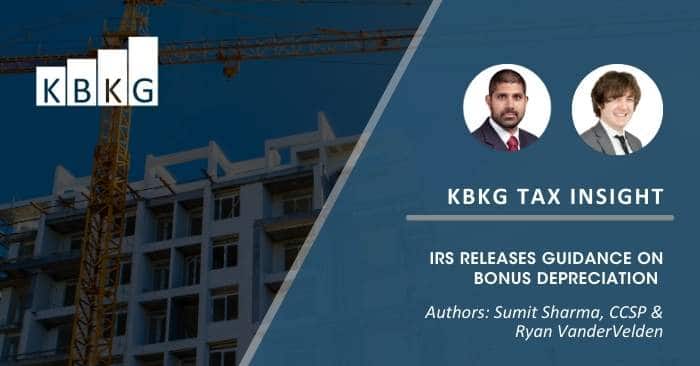On November 6, 2020, the IRS released Revenue Procedure 2020-50 providing guidance on implementing the most recent bonus depreciation regulations. These regulations, issued in September 2020, addressed feedback and slightly revised provisions of the 2019 proposed bonus regulations. Since the Tax Cuts and Jobs Act bonus depreciation rules have changed over the iterations of proposed and final regulations. The purpose of Rev. Proc. 2020-50 is to provide taxpayers guidance when adopting a set of regulations to apply to their property now and going forward.
Revenue Procedure 2020-50 provides procedural guidance for taxpayers who want to apply:
1. 2020 final bonus regulations
2. 2019 final bonus regulations
3. 2019 final bonus regulations and 2019 proposed bonus regulations
Either must be applied entirety and consistently to:
- All depreciable property acquired and placed in service after 9/27/2017 and during taxable years beginning in 2017 through 2020; and
- Components acquired or self-constructed after 9/27/2017 of larger self-constructed property and placed in service during tax years 2017 through 2020.
However once applied, they must continue to apply in subsequent tax years.
KBKG Insight:
The 2019 proposed bonus regulations provide a “component election” that allows a taxpayer to segregate portions of self-constructed property and apply different bonus depreciation rates based on when those components were constructed. However, it was not clear then, how it applied to building components. The 2020 final regulations clarify how the component election applies to buildings. Any taxpayer who began construction on a building before 9/27/2017, should consider adopting the 2020 final regulations.
The first time a taxpayer changes their method of accounting under Rev. Proc. 2020-50 it is deemed to be an automatic impermissible to permissible change, made with a Sec. 481(a) adjustment. The change is executed by either filing an amended federal return or Form 3115 with the taxpayer’s timely filed return. For taxpayers that have already made an accounting method change under this revenue procedure and want to make another change, are deemed to be making a permissible to permissible change and require Commissioner consent to file their Form 3115 with their timely filed return. Rev. Proc. 2020-50 does not apply to property that is affected by a late election or withdrawn election made under Sec. 163(j)(7)(B).
Rev. Proc. 2020-50 also addresses taxpayers that wish to make or revoke late elections under Sections 168(k)(5), 168(k)(7), 168(k)(10), a late component election, a late designated transaction election, or late proposed component election by filing either an amended federal return or Form 3115 accounting method change with the timely filed return. The taxpayer must have already filed their return for the tax year in which the property that is affected by the election is placed-in-service. Also, the taxpayer would adopt the regulations outlined above, as described in Rev. Proc. 2020-50, for that same tax year.
KBKG Case Study:
A taxpayer started construction on their hotel in January of 2017 and incurred $4M of construction costs by September 27, 2017. The hotel was completed in 2019 and placed in service. Total construction costs were $20M. If the component election was never made on a timely filed tax return, the taxpayer would only be eligible for 30% bonus depreciation on any eligible components from the $20M. This taxpayer can make a late component election so any qualified components constructed after September 27, 2017 would be eligible for 100% bonus depreciation.
Taxpayers that want to make changes under Rev. Proc. 2020-50 must use the new automatic change procedures and new designated change numbers as follows.
- Impermissible to permissible (DCN #246)
- Permissible to permissible (DCN #247)
Taxpayers making this change have reduced filing requirements and should file a single Form 3115 for all such changes with a single net Sec. 481(a) adjustment.
After a period of uncertainty, taxpayers now have procedural guidance from the IRS and Treasury Department for adopting bonus depreciation regulations. Taxpayers will now be able to adopt certain regulations in their entirety and apply them consistently moving forward into future tax years. Contact a depreciation specialist to discuss the changes under Rev. Proc. 2020-50.
Download KBKG Tax Insight: IRS Releases Guidance on Bonus Depreciation
Authors: Sumit Sharma, CCSP; Ryan VanderVelden
Contributors: Gian Pazzia, CCSP; Lester Cook, CCSP; Malik Javed, CCSP; Eddie Price, CCSP
About the Authors
 Sumit Sharma – Director
Sumit Sharma – Director
New York
Sumit Sharma is the Director for KBKG, specializing in Cost Segregation and Fixed Assets in the northeast regional market. He joined KBKG as a Senior Manager in 2015. Based in New York City, Sumit has over 12 years of experience conducting fixed asset depreciation reviews, purchase price allocations, cost segregation studies, and more. » Full Bio
 Ryan VanderVelden – Manager
Ryan VanderVelden – Manager
Texas
Operating out of our Dallas-Fort Worth office, Ryan VanderVelden is a manager with KBKG specializing in Cost Segregation and Fixed Asset Services. He has over four years of experience conducting cost segregation studies, fixed asset reviews, repairs/maintenance cost analyses, and retirement studies. Ryan was born and raised in northern California and received a Bachelor of Science in Civil Engineering from California State University, Chico. » Full Bio


